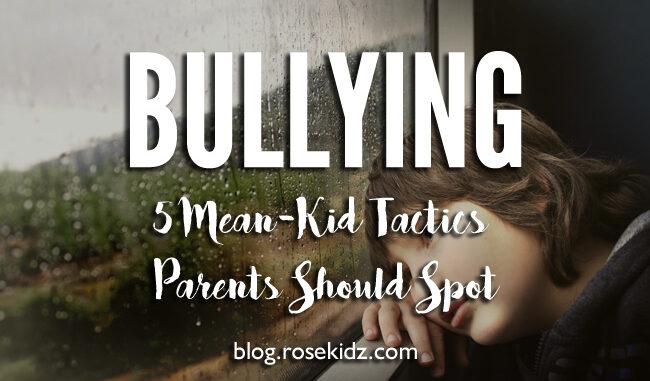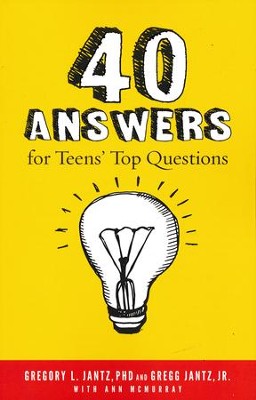
Adolescence, especially early adolescence, is a tough time for kids in general. As a kid, you’re just trying to figure out who you are. Your bodies are changing; your voices are changing; your lives are changing. Because of all these changes, you’re not sure of yourself. When kids aren’t sure of themselves, they feel vulnerable. Being vulnerable makes you more fearful of the attack of others. Some kids decide the best defense is a good offense—the way not to get attacked by others is to make sure they attack first. They get mean.
 Both boys and girls can be mean. Boys are more likely to use physical violence or the threat of violence to achieve their goals, while girls use their words and relationships. Perhaps mean kids act this way because they feel so powerless about their own lives. Maybe they don’t like themselves very much and are afraid others won’t like them, too. But, whatever the reason, bullies are attempting to control others. Mean kids feel better about themselves when they have control over other people.
Both boys and girls can be mean. Boys are more likely to use physical violence or the threat of violence to achieve their goals, while girls use their words and relationships. Perhaps mean kids act this way because they feel so powerless about their own lives. Maybe they don’t like themselves very much and are afraid others won’t like them, too. But, whatever the reason, bullies are attempting to control others. Mean kids feel better about themselves when they have control over other people.
Control Moves
Kids, especially preteen or early teenage kids, feel unsafe just being who they are. Even the so-called popular kids feel embarrassed and ashamed about looks or athletic prowess, how smart they are, or whether or not they have the right clothes, phone, car, etc. Adolescence is a time when so much is changing about who you are, how you feel about yourself, and how you look, that teens turn to each other for security. Sometimes, security means being part of a group you don’t really like, just so you’re not picked on.
5 Mean-Kid Tactics
| Point out in others the things they fear in themselves | If bullies worry that they aren’t attractive or strong enough, they spend time talking about how ugly, poorly dressed, weak, fat, or whatever other kids are. That way, if people are going to talk about someone not being good enough, the talk won’t be about them. |
| Are afraid they won’t stay popular | Mean kids are afraid of finding themselves the unpopular kids that everyone else jokes about or turns their backs on. So to prevent that from happening, they make the jokes and turn their backs on others. |
| Use words to attack others | Mean girls (especially) use words and what they know about another person; they gossip, make-up stories, or reveal secrets—all designed to hurt the other person. Sometimes mean girls physically fight another girl but not usually. Mean boys are more likely to get physical, but they, too, usually begin with a verbal confrontation. |
| Will sometimes use other girls or boys to hurt another person, instead of doing it themselves | Sometimes just the herd mentality of having a bunch of supposed friends on their side is enough pressure to intimidate others. But often, bullies will exert their power over their own group by manipulating others to do their dirty work, staying in the background like a puppet master, pulling other people’s strings. If asked directly about what they are doing, these kids will lie and pretend they don’t know anything about it, especially to adults. |
| Withhold friendship as a way to punish other kids and force them to do what they want | Though both boys and girls do this, girls will sometimes take it a step further. Mean girls can pretend to be a friend, only to find out someone’s deepest secrets; then they turn around and hurt them by telling the secrets and laughing about them with other people. |
Thankfully, there aren’t many mean kids around, but if you asked at any middle school who the bullies are, you would find out about at least one. It’s important to remember that the power a mean kid might have over you is only the power you give him or her. If you know who you are and like yourself, a bully doesn’t have much power over you. They can still say and do things that hurt, but they can’t truly make you feel bad about yourself.
You are in charge of how you feel about you, so refuse to allow mean kids to tell you what to do or think about yourself. Refuse to give them the power and eventually they’ll leave you alone.
- Who are the bullies at your school and why do you think they are so mean?
- Now that you know what bullies do, watch out that you don’t act like them.
- Why do you think most adult men and women don’t continue to act like bullies after middle school and high school?
40 Answers To Teens’ Top Questions By Gregory L. Jantz
 Talk with your teenager … Be there for your tween. Parents are often encouraged to talk with their kids, but they don t always feel equipped to deal with these difficult topics off the cuff, right? At the turn of a page, 40 Answers to Teens’ Top Questions is packed with the most common teen questions, solutions, biblical advice, plus parenting tips that are laid out clearly in an easy-to-read way that your teen can read on their own or with you!
Talk with your teenager … Be there for your tween. Parents are often encouraged to talk with their kids, but they don t always feel equipped to deal with these difficult topics off the cuff, right? At the turn of a page, 40 Answers to Teens’ Top Questions is packed with the most common teen questions, solutions, biblical advice, plus parenting tips that are laid out clearly in an easy-to-read way that your teen can read on their own or with you!
Includes
- 40 real & relevant topics to teens & preteens
- Each question opens with real comments from an adolescent to other adolescents
- Straightforward answers from an expert addressed to teens with honesty and humor
- Each topic includes practical exercises to “Talk It Out,” “Act It Out,” and Think It Out”
- “For Parents” section on each topic addresses concerns and gives ideas and options to create open communication
- and more!
…I love that it is written from a christian perspective and is right in line with my beliefs and views… What really makes this book great is the fact that the main sections are written by a high-schooler and then the parent sections for discussion and guidance are written by his father. I think the way it is written is also great in helping them realize that others such as friends or acquaintances may think they know what they are talking about but are not always accurate. This book gives them concrete answers…”–JustinTime, Review from Hendrickson-Rose
You already know not to lecture your teen, but it can be hard to reason with them when emotions run high, so where do you turn? With over decades of experience counseling teens and parents (as well as being a parent of a teen), Dr. Gregory Jantz has the top 40 practical and compassionate answers you’re looking for. From peer pressure and bullies to zits and dating, parents will discover practical ways to have open and honest conversations with their teens while equipping them to navigate toward early adulthood.
40 Answers to Teens’ Top Questions is perfect for counseling, parents groups, youth ministry leaders, church giveaways, and more!
This book has it all covered… Sometimes its hard to pin point exactly what is bothering a teenager without seaming like your prying into their “business”; this helped me connect on a more mature and pliable way with my sons. I love this book and will pass it on to other families!–Goodlilgingerjoy1, Review from Hendrickson-Rose
Relationship-Building & Conflict Resolution Guide for Teens and Parents
Dr. Gregory Jantz and his son Gregg Jr. will help you and your teen learn to speak the same language, respect each other s thoughts and feelings, and effectively address 40 critical topics. Get the confidence you need to answer your teen s tough questions and keep communication open. Parents and other adults will be amazed at the mutual respect and trust you ve built between you and your teen.
You know your teen is going to be getting these answers about puberty, how to grow up, and more, from their friends, the internet, and other adults, but they want and need to hear these answers from you! This guide will help you
- Communicate clearly & effectively listen to your teen to build trust, respect, and a lasting bond
- Easily bring up hot teen topics so your teen feels free to openly share
- Gain the confidence to equip your teen with everything they need to make godly choices every day
- and so much more!
240 pgs, paperback, 5.5 x 8.5 inches.
This is such a great book for teenagers and parents alike! It gives relevant problems with amazing tips for teenagers and parents! Each chapter talks about specific problems a teen may have and how and why they may feel that way. Talks about ways to resolve these problems and gives it from both the teenager and parent perspective that can be really helpful for teenagers! There are also parenting tips to help parents overcome these obstacles! I highly recommend this book to any parent who has a teenager…–Katriza, Review from Hendrickson-Rose

Great tips! And congrats to the 2018 finalists!